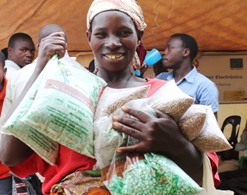
In Mozambique, the percentage of smallholder farmers with access to credit facilities has steadily decreased over the last 10 years, while inefficiencies in production and distribution have reduced the competitiveness of domestic products. The limited development of agro-industry further reduces market opportunities for smallholder and emerging farmers. Without secure market prospects and lacking risk-covering facilities, it is difficult for farmers, especially low-capacity smallholders, to access the capital needed to invest in and expand their farms.
Launched at the beginning of the agricultural season 2015/2016, the electronic voucher scheme will contribute to the improvement of market access for farmers, stronger market networks, and the distribution of quality agricultural inputs through the involvement of agro-dealers. A significant advantage of FAO’s electronic voucher scheme in Mozambique is that farmers will have more freedom to decide what, where and when to buy their inputs, ensuring that they remain the central decision makers in the scheme.
The first of its kind in Mozambique, FAO’s new electronic voucher scheme is a financial inclusion tool for smallholder and emerging farmers, offering increased access to the market, as well as security, flexibility and choice. While currently in its pilot phase in Manica Province, the electronic voucher will gradually replace the paper voucher scheme, which has been run by FAO in the provinces of Manica, Zambézia, Nampula and Sofala since 2013.
Coordinator of the FAO MDG 1c Sub-programme, Walter de Oliveira, explains that "in addition to adding flexibility to the production decisions of farmers, these electronic vouchers will improve knowledge regarding electronic money and increase familiarity with technology among smallholders, particularly regarding e-money services”.
Eduardo Lino, a local farmer attending the launch of the electronic voucher in the District of Sussundenga, Manica Province, in November 2015, is excited about the new scheme. Already a beneficiary of the paper voucher, he understands the structure in which the beneficiary pays part of the total worth of the voucher, while FAO puts forward the rest. As soon as his electronic voucher has been activated, Lino has access to a wide range of inputs from any of the agro-dealers involved in the scheme. FAO carefully monitors the quality of the seeds available for purchase within this scheme, which Lino remarks is a significant advantage for him. “I had a much better crop yield after using inputs bought with the paper voucher last year”, he comments, and is hopeful that “the increase in input choices with the electronic voucher will again improve my production this season”.
Another beneficiary of the paper voucher scheme preparing to transfer to the electronic scheme, Augusto Janota, attended a workshop on the electronic voucher which FAO held in his home district of Chimoio, Manica Province. “There is a much greater chance of my crops growing when I use the treated seeds purchased through the FAO voucher programme, as well as the fertilizers and other inputs that are available in the programme,” he noted during the workshop. “I like this because outside the scheme I sometimes pay more money for really poor quality products”. The presence of poor quality products - especially seeds- in the market is one of the main problems raised by smallholder farmers. The absence of a formal market of agricultural inputs in rural areas, and the poor quality of the products available, result in farmers beingdiscouraged from purchasing products from the market.
The launch of the electronic voucher is a step further in the implementation of the Millennium Development Goal 1c Sub-programme (MDG 1c), one component of which aims to increase smallholders’ and emerging farmers’ access to the market and to improved agricultural inputs by providing them with temporary subsidies in the form of this voucher scheme. It will run until 2018, at which point the Government of Mozambique will take over the helm. Marcelo Chaquisse, speaking on behalf of the Ministry of Agriculture and Food Security, says that the Ministry is “very positive about the electronic voucher scheme. It is in line with the strategic plan of the Ministry, which is dedicated to increasing the productivity and production of our farmers.”
The overall goal of the MDG1c, funded by the European Commission and the Government of Mozambique, is to speed up progress towards achieving the first Millennium Development Goal to reduce hunger and to improve food security and nutrition in Mozambique.
